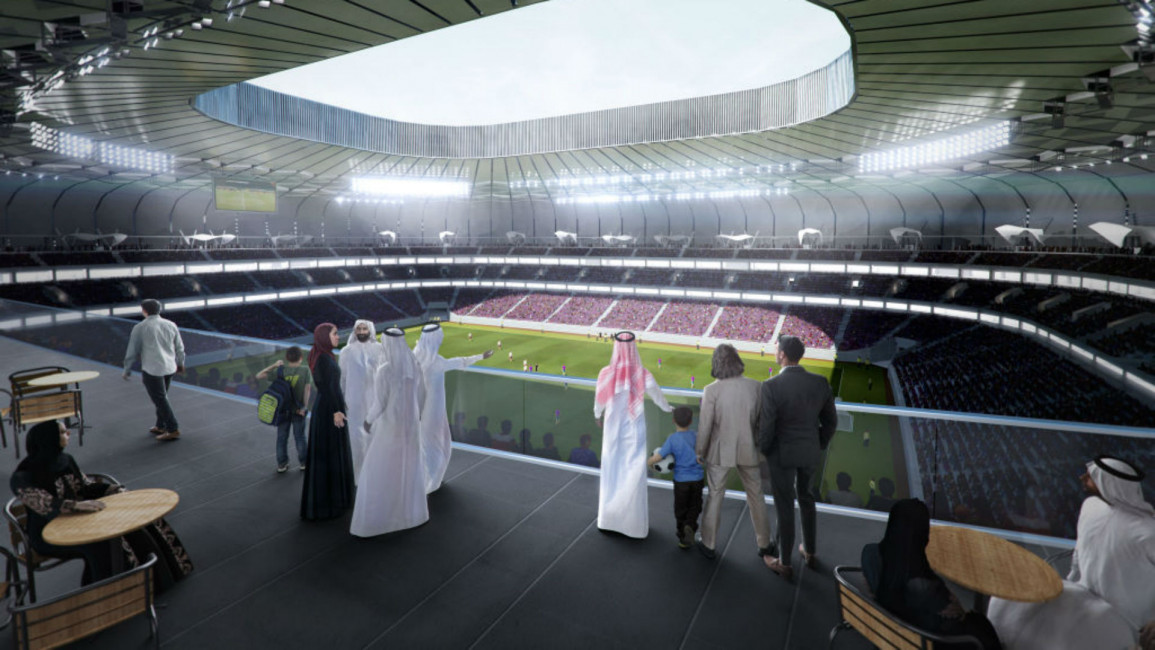
Why has the FA changed its tune on Qatar's World Cup?
Why has the FA changed its tune on Qatar's World Cup?
Comment: Britain is hoping for $42 billion worth of trade in the Gulf post-Brexit, and Qatar is to be a major part of that, writes Anthony Harwood.
5 min read
An artist's impression of the Qatar Foundation Stadium [Getty]
This could be the moment when Qatar's enemies were finally forced to accept that the Gulf state will host the 2022 World Cup, after all.
There was no real doubt that it would, of course, because FIFA could not afford the huge legal bill, had it suddenly switched host countries.
But this week's decision by the Football Association to sign an agreement with Qatar might well dampen criticism which began when Qatar controversially won the FIFA vote in 2010.
Three years ago, Greg Dyke, then chairman of the FA, described it as "the worst moment in FIFA's history," and called for both Qatar and Russia to be stripped of the tournament if evidence of corruption was found.
Since then Doha's enemies have kept up the charge, with enough importance attached to the issue for it to be suggested that a Saudi-led blockade of Qatar could be called off if the World Cup was taken off the small Gulf state.
Reports emerged in October claiming there was "an increasing political risk that Qatar may not host the World Cup in 2022".
The stories were based on a study by management consultants, Cornerstone Global, which warned that companies working on the $200bn (£153bn) construction programme considered it a "high-risk project", due to the destabilising effect of the blockade.
Qatar denied there was a problem, claiming the report had been written by people "with an affiliation to the countries blockading Qatar".
 |
The deal will include arranging friendly matches across all age groups |  |
The other problem for Qatar's enemies was that the Garcia report, written by FIFA investigator Michael Garcia, found no smoking gun showing that either Qatar or Russia bribed FIFA officials to get their votes, or there was not enough hard evidence that could result in the World Cup being taken away from either country.
But that did not stop whistleblowers from coming forward.
Last month Bonita Mersiades, who worked on Australia's failed 2022 bid, wrote a book claiming that Qatar's state TV company agreed a $100million payment to FIFA if they got the tournament.
But is that any different to the North American broadcasters paying FIFA $300m extra if it picks the region to host the 2026 World Cup?
The British press continues to be hostile towards Qatar because the tournament will be held during winter, to avoid the searing heat in the Gulf, and consequently mess up the Premier League season.
It gleefully seizes on negative reports, such as the one which claimed Qatar will only let fans drink alcohol in scorching and isolated desert sites far away from the stadiums, to avoid offending the locals.
The Sun newspaper quoted an FA source saying: "Who in their right mind would go to an Arab state where they shunt you miles into the desert to get a pint before the game?
"Sponsors like Budweiser are in an awkward position and there are real fears of a global boycott."
Yet, this week the FA chairman, Greg Clarke, was in Qatar signing a memorandum of understanding to "share knowledge" with Qatar.
 |
Reports emerged in October claiming there was 'an increasing political risk that Qatar may not host the World Cup in 2022' |  |
The deal will include arranging friendly matches across all age groups.
"This will mark the beginning of even deeper co-operation between out two countries, and underlines the UK's support for Qatar in delivering a successful World Cup 2022."
Can't be much clearer than that.
So what has made the FA change its tune? The answer is trade.
Britain is hoping for $42 billion worth of trade in the Gulf post-Brexit, and Qatar is to be a major part of that.
Last month, Doha signed a $7bn deal with BAE Systems for 24 Typhoon fighter jets that will ensure UK production of the combat aircraft continues into the next decade.
The announcement was credited with saving thousands of British manufacturing jobs.
There is also a World Cup trade bonanza up for grabs as Qatar steps up its preparations for the tournament, spending $71 million every week.
Read more: Could the beautiful game resolve the Gulf diplomatic crisis?
Read more: Could the beautiful game resolve the Gulf diplomatic crisis?
Contracts include CCTV installation at stadiums, designing bus depots and a port redevelopment project.
The huge importance to Britain of trade in the Middle East can be seen by the fact that the UK government is prepared to turn a blind eye to the atrocities committed by a Saudi-led alliance during its two-year bombing campaign of Yemen, just so that it can continue to pursue arms deals with Riyadh.
Or the fact that Theresa May will not speak up for the human rights of pro-democracy demonstrators on death row when she sits down with the Saudi king.
So it should come as no real surprise that UK has decided to draw a line under the seven-year row over the awarding of the FIFA World Cup to Qatar, and thrown itself four-square behind Doha.
Anthony Harwood is a former foreign editor of the Daily Mail.
Follow him on Twitter: @anthonyjharwood
Opinions expressed in this article remain those of the author and do not necessarily represent those of The New Arab, its editorial board or staff.
Anthony Harwood is a former foreign editor of the Daily Mail.
Follow him on Twitter: @anthonyjharwood
Opinions expressed in this article remain those of the author and do not necessarily represent those of The New Arab, its editorial board or staff.



